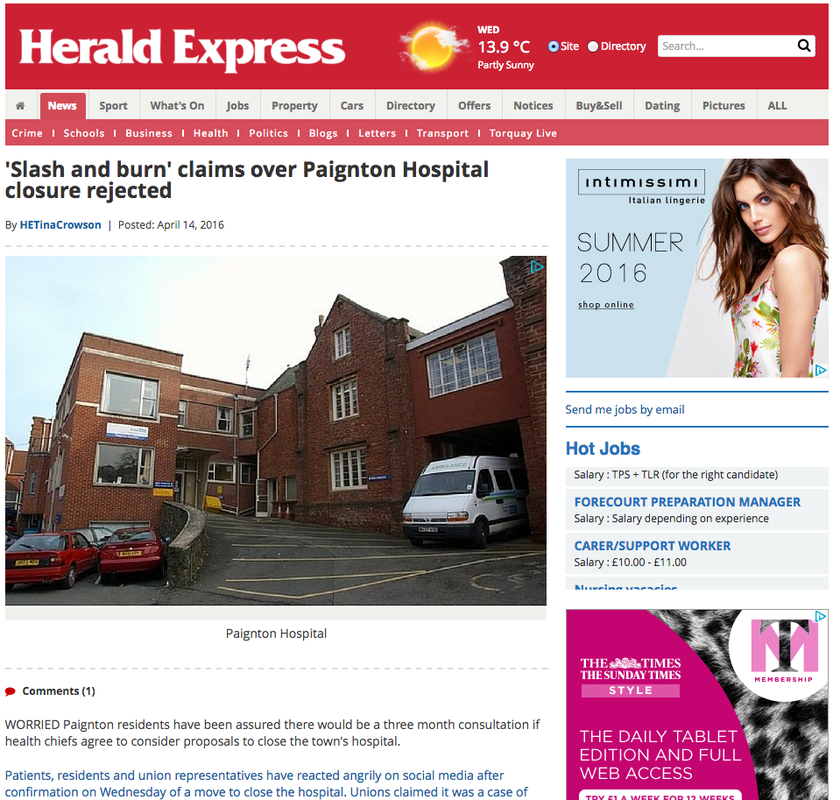Local NHS leaders have claimed that the move could increase investment in healthcare facilities closer to home and avoid the need for people to go into hospital.
But those who do need hospital treatment will find four community hospitals - in Bovey Tracey, Ashburton, Dartmouth and Paignton - closed and the number of minor injury units reduced from seven to just three, putting additional pressure on other, already over-stretched NHS facilities. In its consultation document (page 12), the South Devon and Torbay Clinical Commissioning Group confirm that "the demands on funds outstrip any new funding available and the CCG needs to make significant savings over each of the coming years. For 2016/17 we currently have a £16m shortfall." The proposed closures, described as a "slash and burn" approach to local NHS services by Torbay & South Devon Trades Union Council secretary Paul Raybould, are expected to contribute just £1.4m to this shortfall. Yet the entire £16m total deficit in South Devon NHS funding provoking these changes could easily be found by the government if we were to stop handing a net £121 million to the European Union every single week - the amount Britain pays into the EU budget over and above all the grants and subsidies the EU hands back. Unless the local NHS funding shortfall is found from somewhere, as Mr Raybould added: "We fear other community hospitals may also be at risk with the CCG looking to save money." Since the sum to save these four Devon hospitals represents less than a day's worth of the money that would be saved by leaving the EU, a great step towards finding the money to stop these cuts is to vote to leave the EU in the referendum on 23 June.
0 Comments
As the EU referendum edges closer, the Democracy Movement has launched its latest campaign for a 'leave' vote on 23 June.
Better Britain aims to highlight the huge net cost of Britain's payments into the EU budget - an astonishing £121 million every single week, even accounting for our rebate and all the grants and subsidies we receive back - and to show what a big difference this money could instead make to people's lives and to the public services and infrastructure up and down the country on which we all depend. In every area of the country today there are examples of public services that are being cut, or improvements that can’t be made, due to budget shortfalls that are tiny fractions of our net contribution to the EU budget - from insufficient school places to overstretched GP surgeries, from delayed road improvements to funding new, life-changing drugs on the NHS. Cash costs There has been considerable debate about the accurate cash cost of EU membership. So where does our figure of £121 million a week come from? It starts with a Treasury report 'EU Finances 2015', published in December. These official government figures show that, last year, the gross cost of the EU was £17.8 billion. This is the figure that gives rise to the often-quoted amount of £350 million a week. However, this figure doesn't account for our rebate, or money we receive back from the EU; an omission that has, unfortunately, been the focus of a huge amount of debate and has obscured the real, still very significant net costs. After subtracting our rebate of £4.8 billion, together with public sector grants and subsidies back from the EU of £4.5 billion, that leaves a net cost in 2015 of £8.5 billion. But that's not quite the end of the story. The EU also gives grants to some private institutions. Paragraph 3.7, under the table at the link above, shows that the latest published figures relate to 2013 and amount to a further £1.4 billion. Finally, in calculating UK spending on international aid towards our legal commitment of 0.7% of national income, the government also includes our share of aid provided to developing countries by the EU. If we leave the EU and are no longer paying into the EU budget, we will not be able to count a share of EU aid towards our overall spending commitment. So an equivalent amount will need to be added to the international aid budget to make up the shortfall towards meeting the 0.7% commitment. According to the Department for International Development document Statistics on International Development 2015, in 2014 the share of EU aid that the UK counted towards our 0.7% commitment was £816 million. This leaves an estimated final net total paid to the EU in 2015 - the spending of which the government will be able to reallocate if we leave - of £6.3 billion a year, or £121 million a week. It's 'estimated', because those figures on grants to private institutions and international aid relate to 2013 and 2014, rather than 2015 - but those are the latest years for which figures are available. Indirect costs This total represents the best estimate for the published, cash costs of EU membership. It does not include the indirect costs, such as the cost of regulation. Over the scale and breadth of policy the EU now governs, the cost of regulation is very hard to quantify. Some groups, like Open Europe, have come up with credible figures. However, even on leaving the EU, we will very likely wish to continue with some EU-derived regulations in UK law, together with some other product and market rules that have been made internationally and have just been handed down through the EU. The government has refused consistently to conduct a full cost-benefit analysis of Britain's EU membership. Much is also written about the proportion of our trade that goes to EU countries. It's not often noted that only a relatively small proportion of the UK economy is involved in international trade at all. Most UK economic activity is domestic, meaning that for most businesses EU single market regulations are all cost for no benefit. Due to the scale of EU regulation and the big question of which regulations we might keep or bin after exit, the indirect costs are a hugely debatable area. That's why we're focusing only on the verifiable, officially published cash costs of EU membership. £121 million is the extra amount every week we know with far greater certainty that the government will have available to spend, if we vote to leave the EU. IN misleads The EU lobby often tries to make the scale of the money Britain pays into the EU budget appear smaller, by comparing it to a huge number like Britain's total GDP, or dividing it by a large number like the total population to get a figure 'per person'. In doing so, they try to suggest absurdly that £121 million every week isn't really much money to worry about. Better Britain aims to show how wrong they are. Our campaign will detail all the ways up and down the country in which public services are being cut, or aren't able to improve, due to shortfalls in funding that are a tiny fraction of the huge payments made every week to the EU. It will show how a vote to leave the EU on 23 June can make a Better Britain for us all. |
Better BritainHighlighting how the UK's ArchivesCategories
All
|
|
The Democracy Movement, Marlborough House, High Street,
Hartley Wintney, Hampshire RG27 8NY T: 020 3637 4546 E: campaign @ democracymovement.org.uk © 2023 Democracy Movement. All rights reserved. |
Our legal status is as a registered company, limited by guarantee - a non-profit status. No. 3673846. In accordance with legal requirements, we file annual accounts and the details of our directors every year with Companies House.
Privacy statement: We will not pass on your contact details to any other organisation or use them for any purposes other than promoting the activities of our campaigns. |



 RSS Feed
RSS Feed